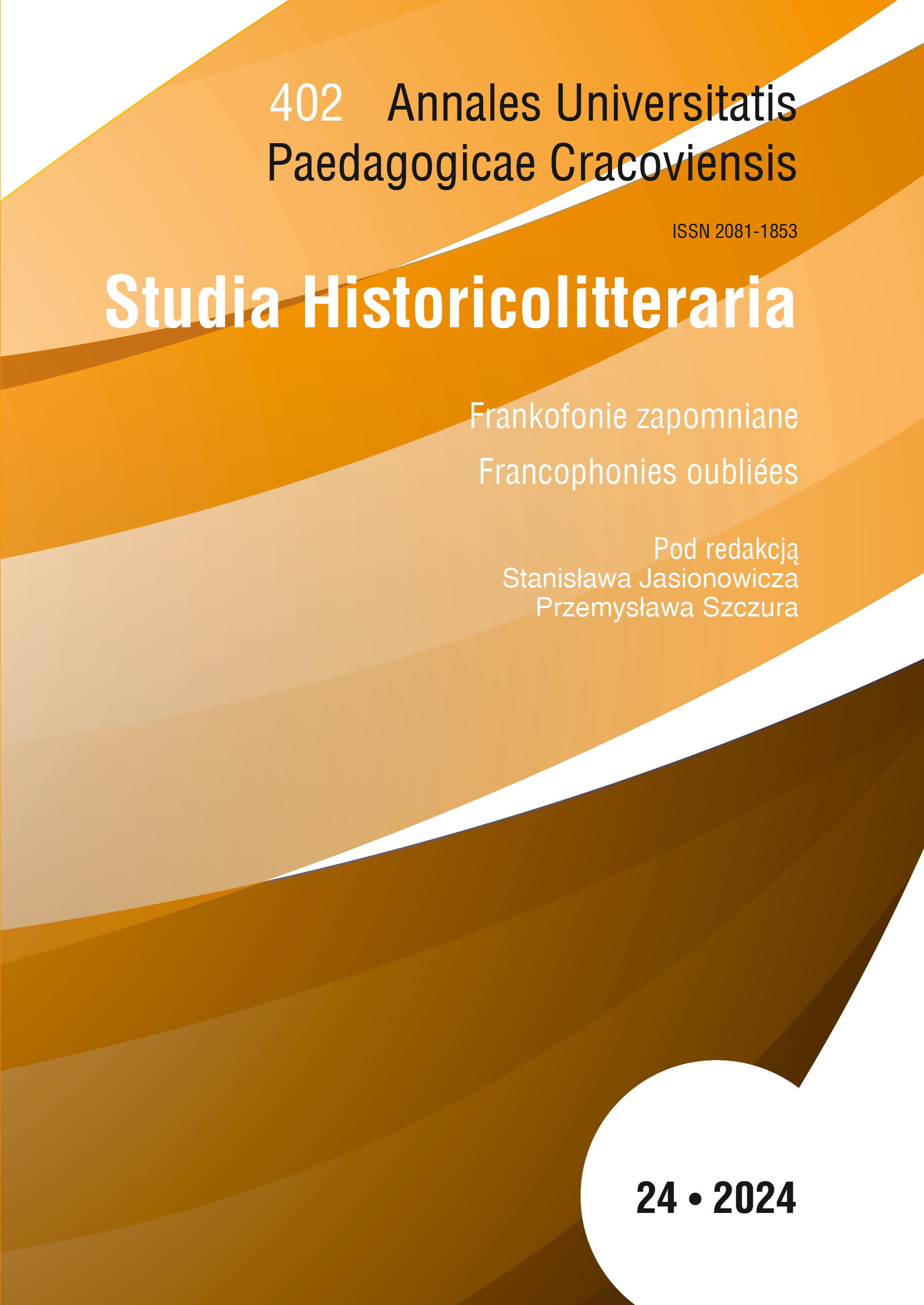Between Presence and Absence: Bruno Durocher and Piotr Rawicz
Main Article Content
Abstract
Bruno Durocher and Piotr Rawicz are now known (or not) as French writers. However, it was only after surviving concentration camps (Mauthausen and Auschwitz) that they decided to leave their hometowns, Cracow and Lviv, to emigrate to France and change – to French – their language of artistic expression. It was, of course, not only an artistic decision, but also an identity
strategy that correlates physical emigration with emigration from the language. Both “uprooted” and “stateless”, they develop these identity strategies differently and represent them in opposing ways in their literary works. Placed between languages, cultures, and identities, these works are marked by routes, displacements, and wanderings. The present study aims to analyze the linguistic, testimonial and literary choices of two writers and see how, through their biographical and scriptural trajectories, they face their condition of the perpetual stranger, condemned to the state of – as formulates it Jean-Claude Charles – “enracinerrance”.
Downloads
Article Details

This work is licensed under a Creative Commons Attribution-NonCommercial-NoDerivatives 4.0 International License.
COPYRIGHT POLICY
The publisher of "Annales Universitatis Paedagogicae Cracoviensis.Studia Historicolitteraria" is authorised to use and distribute all the materials published in the journal on the basis of a non-exclusive licence agreement unlimited in time – previously concluded for an indefinite period of time each time with the author of a specific paper in the fields of exploitation specified in the agreement.
OPEN ACCESS POLICY
"Annales Universitatis Paedagogicae Cracoviensis.Studia Historicolitteraria” is an open access journal, and all its contents are available for free to users and/or their institutions on the basis of non-exclusive licenses under Creative Commons (CC BY CC-BY-4.0). Users can read, download, make copies, distribute, print, search, or to link to full text articles in this journal without the prior permission of the publisher or the author.This is consistent with the definition of open access BOAI (http://www.soros.org/openaccess).
References
Adams J., Le Sang du ciel ou l’expérience poétique d’un survivant, « Tsafon » 2021, n° 82, p. 57–68.
Ausoni A., Mémoires d’outre langue. Écriture translingue de soi, Genève 2018.
Bodzińska-Bobkowska J., Auto/bio/géo/graphies: les enjeux spatiaux de la mémoire dans les récits autobiographiques et testimoniaux du temps de la guerre chez Durocher, Langfus, Rawicz, « Quêtes littéraires » 2022, n° 12, p. 85–97.
Bodzińska-Bobkowska J., Terytorium podrzutka. Bronisław Kamiński/Bruno Durocher. Próba monografii, Gdańsk 2021.
Ciarkowska A., Lwów -Paryż. Przemiany tożsamości Piotra Rawicza, [dans:] Konstrukcje i destrukcje tożsamości, t. 5, éd. E. Golachowska, D. Pazio-Wlazłowska, Warszawa, 2019, p. 327–334.
Ciarkowska A., Lwow – héritage multiculturel de Piotr Rawicz, [dans:] Premiers savoirs de la Shoah, éd. Judith Lindenberg, Paris 2017, p. 139–154.
Conversation d’Anna Langfus avec Piotr Rawicz, « L’Arche » 1962, n° 61, p. 16–17.
Durocher B., Les Livres de l’homme. Œuvre complète I. Poésie, À l’image de l’homme, Paris 2012.
L’Espèce humaine et autres écrits des camps, éd. Dominique Moncond’huy, Paris 2021.
Gościcki J., Préface, [dans:] P. Rawicz, Krew nieba, Kraków 2003.
Jurgenson L., Piotr Rawicz: les labyrinthes de la fiction identitaire, [dans:] Autour des écrivains franco-russes, éd. M. L. Clément, Paris 2008, p. 245–257.
Kamiński-Durocher B., Obraz człowieka, Paris 1989 (inédit).
Katz-Hewetson J., Piotr Rawicz – pisarz zapomniany, « Kultura » 1990, n° 3, p. 125–133.
Kaufmann J., Langage de la violence et violence du langage : la Shoah dans le Sang du ciel de Piotr Rawicz, « Études Art et Littérature. Université de Jérusalem » 1993, n° 20, p. 50–66.
Kertész I., Holocauste comme culture, trad. N. Zaremba-Huzsvai et Ch. Zaremba, Arles 2009.
Lê L., Par ailleurs, exils, Paris 2014.
Leiris M., Journal 1922–1989, éd. J. Jamin, Paris 1992.
Les Livres de l’homme. Œuvre complète IV. Album. Les visages de l’homme, éd. X. Houssain et N. Gdalia, Paris 2017.
Neher, A., L’Exil de la parole. Du silence biblique au silence d’Auschwitz, Paris 1970.
Prstojevic A., Le Témoin et la bibliothèque. Comment la Shoah est devenue un sujet romanesque, Nantes 2012.
Rawicz P., Préface [dans:] D. Kiš, Sablier, Paris 1982, p. I-XIII.
Rawicz P., Le sang du ciel, Paris 1961.
Robin R., Le Deuil de l’origine. Une langue en trop, une langue en moins, Vincennes 2003.
Romanowiczowa Z., Czy istnieje życie poobozowe, « Kultura » 1999, n° 1–2, p. 25–38.
Sadkowski P., Langue (dé)colonisée, langue colonisatrice : la surconscience linguistique et la condition juive chez Albert Cohen et Piotr Rawicz, « Romanica Silesiana » 2011,
n° 6, p. 89–109.
Sadkowski P., Krew nieba Piotra Rawicza, « Teka » 2005/2006, n° 5–6, p. 329–333.
Sadkowski P., Une mystérieuse matière hétérolinguistique. La réception du « Sang du ciel » en Pologne, [dans:] Un ciel de sang et de cendres. Piotr Rawicz et la solitude du témoin, éd. A. D. Rosenman, F. Louwagie, Paris 2013, p. 97–110.
Szczęsna J., Niedostrzeżeni pisarze i przeoczone książki, « Gazeta Wyborcza » 2004, 25–26 septembre, p. 17.
Semprun J., Wiesel E., Se taire est impossible, Paris 1995.
Ubertowska A., Historie biotyczne. Między estetyką a geotraumą, Warszawa 2020.
Wiesel E., Le Mendiant de Jérusalem, Paris 1998.
